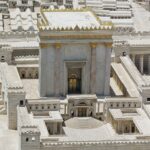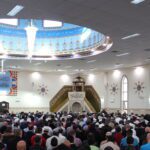Over the last few years there have been a reports of councils removing Christmas decorations from public places so they do not offend Muslims. How true these reports are and what actually happened in these council meetings is difficult to judge, but the subject of Christmas raises a very important question for Christians and Muslims, a question that is far more than just decorations. It is a question that gets to the very heart of our faiths.
‘Immanuel’ or Simply a Man?
For the Christians, Christmas is the time we remember and celebrate the birth of Jesus. We celebrate God making Mary conceive by his Holy Spirit and coming to us as a man, Immanuel. It is a time for thinking about the incarnation.
Muslims also accept the virgin birth of Jesus through the Holy Spirit—though the Qur’an says his mother Mary/Mariam is the sister of Moses and Aaron and the daughter of Amram (Qur’an 3:35-51, 19:16ff, 66:12). However, Islam rejects any notion of the incarnation. Jesus was simply a man: a great man, a prophet, but only a man.
Therefore Christmas is a great time for Christians to think about how we speak the doctrine of the incarnation to the world.
The objections that Muslims have to the incarnation are that is it illogical and a compromise of God’s nature, and that it is against Scripture. To make progress with our Muslim friends we need to discuss: creation, God’s accommodation, God dwelling with his people, and the image of God. I will focus on two of these in this article and invite you to read my booklet on the subject if you wish to read further.’
1. Creation
The doctrine of the incarnation states that God connected personally with creation in what is called the hypostatic union. That is, there is a union of two natures, one divine and one created, in the person (hypostasis) of Jesus—and that in this union neither nature is compromised. Christians are not saying that God changed his nature from divine to created but that he added a created body to his life. Muslims reject the hypostatic union as a compromise of God’s transcendence.
The way forward here is to show that the hypostatic union is not the only union God has with creation, but that whenever God interacts with creation there is some kind of union between a divine and created nature, and neither nature is compromised. Consider God’s sustaining power.
God sustains our existence and will do so even into the resurrection, which will be everlasting. But this means God’s divine power must permanently connect in some way with a created nature. If there is no connection then God is not sustaining us. Does this connection change or compromise God’s nature? No. Therefore, in God’s act of sustaining we see two natures permanently connected and neither is compromised. We could explore similar parallels with regard to God’s omnipresence, his self-revelation etc.
But the point is, God can touch creation. It was the Greek philosophies that saw God as so transcendent that he could not connect with creation directly and it was because of their Greek doctrine of creation that early Christian heretics such as the Docetists (who denied that Jesus was a real human) and Arians (who denied that he was truly God) rejected the incarnation.
The doctrine of creation is the basis for the incarnation and we need to talk with Muslims about this. And we can press this point, because even the Qur’an acknowledges that Allah creates, sustains, is omnipresent, and reveals: in fact he gets his hands dirty when he creates Adam from clay (Qur’an 38:71-75). According to the Qur’an (75:22-23), Allah will be seen by Muslims on judgment day—apparently without compromising his divine nature. Muslims have no logical grounds for rejecting the incarnation.
2. God Dwells with His People
Muslim leaders tell us that the incarnation is a denial of Scripture. But the problem is that their scripture, the Qur’an, has a very different message from the Law of Moses, the books of the prophets, the Psalms, and the Gospel: The Qur’an has no temple theology.
By the time of Muhammad the temple in Jerusalem had been destroyed for over 500 years and Judaism had developed into a religion that made-do without a temple—we could call it “no-temple Judaism”. The influence of no-temple theology on Muhammad (and thus the Qur’an) was profound—producing a theology where God never dwells with his people. In the Qur’an, Allah does not dwell with Adam in the garden; nor Allah does he dwell in a tabernacle or temple; nor can he be found in paradise. This is important because Jesus describes himself as a temple. Temple theology is a basis for the incarnation.
We need to discuss temple theology with Muslims and ask why the Qur’an has none while all the other Old Testament prophets (whom they officially accept) do? Helping them understand the temple and God’s presence will help them understand the incarnation.
Good Grounds for Confidence
These are just some of the issues that we might raise when we speak to Muslim’s about the incarnation. We could also discuss how God always limits and accommodates himself whenever he deals with creation in any way. Another important topic to consider is the doctrine of the Image of God, which states that humanity: represents God, can display God’s character, and will share in God’s glory. These issues too are important foundations for the incarnation and you can explore them further here http://engagingwithislam.org/l…
Yet as we celebrate Christmas this year, and face new challenges to its message, Christians need to be assured that the Gospel is true, reasonable, and the message of all the prophets. We have good grounds for what we believe, and this solid ground is the place to start when we explain the incarnation to Muslims.















